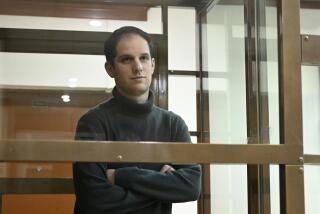U.S., Soviets Fail to Agree on Renewing Airline Links
- Share via
WASHINGTON — U.S.-Soviet negotiations to resume commercial airline traffic between the two countries have broken down, ending any chance that President Reagan and Soviet leader Mikhail S. Gorbachev could sign an aviation pact at their Geneva summit next month, State Department officials said Monday.
U.S. officials had hoped that Reagan and Gorbachev could put the finishing touches on an agreement to resume direct airline links during their Nov. 19-20 meeting, permitting the leaders to put some gloss of success on the summit even if weightier disputes prove to be insoluble.
But the two sides apparently were too far apart even for that. State Department spokesman Bernard Kalb announced that the talks ended “without an agreement,” and he said no date was set for resumption.
Soviets Reject Even Split
A U.S. official said later that the Soviets rejected U.S. proposals that would have guaranteed Pan American World Airways, the only U.S. carrier that had provided air service to Moscow, an even division of the business with the Soviet airline Aeroflot.
“Our carrier was only interested in getting back into the market if it could get an equitable share,” said the official, who declined to be identified. “We put forward proposals which would have done that. The Soviets weren’t interested.”
Pan Am ended its twice-a-week flights to Moscow in 1978. Airline officials complained at the time that Soviet restrictions made the route unprofitable.
For one thing, the airline said Soviet citizens paid for their tickets in rubles, which cannot be converted freely into dollars. Besides, Aeroflot’s accounting measures permit the Soviet airline to offer subsidized fares that Pan Am cannot match if it hopes to make a profit, U.S. officials said.
Also, the Soviet negotiators said that previous restrictions on Pan Am would apply. These included restricting the carrier’s Moscow office to an inconvenient site, a ban on any outdoor signs and a ban on a street-level office for Pan Am.
Aeroflot service was suspended in late 1981 as part of a package of U.S. sanctions against the Soviet Union. The sanctions were imposed in response to what was seen as Soviet pressure on Poland requiring it to crack down on the Solidarity independent trade union.
The Soviet airline’s U.S. landing rights at New York and Washington were permanently canceled in 1983 after the Soviets shot down a South Korean airliner, killing all 269 aboard.
A Captive Market
“The Soviet market, such as it is, is pretty much a captive of the other carrier (Aeroflot),” the U.S. official said. “Unless we can create a situation where it is of interest to one of our carriers, the talks won’t be resumed.”
He said that Aeroflot, which wants to resume its flights from Moscow to New York and to Washington, will not be allowed back into the United States without reciprocal service by a U.S. airline. Asked why Aeroflot was allowed to continue the flights between 1978 and 1981 when there was no corresponding U.S. service, the official said, “They were already in.”
Meanwhile, Secretary of State George P. Shultz and Soviet Foreign Minister Eduard A. Shevardnadze scheduled a meeting for Friday in New York to complete the preliminary work on the Reagan-Gorbachev meeting. Shevardnadze is scheduled to address the U.N. General Assembly on Thursday.
The State Department also announced that U.S. and Soviet diplomats will meet Oct. 31 and Nov. 1 in Washington to discuss Central America and the Caribbean. It will be the fifth such U.S.-Soviet discussion of regional issues following earlier sessions on the Mideast, Afghanistan, East Asia and southern Africa.
Kalb said the meeting is intended as “an exchange of views but not a negotiating session.” U.S. officials said Washington will not change its policy as a result of the talks and does not expect the Soviets to alter their position either.
Elliott Abrams, assistant secretary of state for inter-American affairs, will head the U.S. delegation. The chief Soviet delegate will be Vladimir N. Kazimirov, chief of the Latin America division of the Foreign Ministry.
More to Read
Sign up for Essential California
The most important California stories and recommendations in your inbox every morning.
You may occasionally receive promotional content from the Los Angeles Times.













